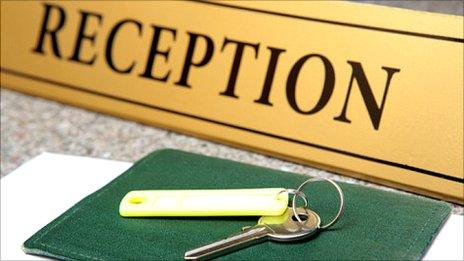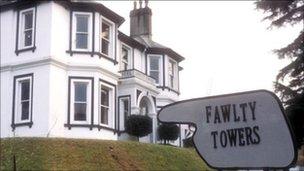How online guest books changed hotels
- Published

Millions of travellers describe through online reviews the sort of welcome they receive at a hotel
Travel website TripAdvisor is facing legal action from up to 700 hotel and guesthouse owners who complain they are victims of unfair reviews. So how much do these peer review sites matter?
Once, the power to make or break a hotel's reputation was the preserve of guide book editors and newspaper travel writers.
But since TripAdvisor launched in 2000, 35 million people have put fingertips to keyboard to offer their view of accommodation the world over.
For many travellers, such sites have become essential reading before booking a break.
TripAdvisor attracts 40 million monthly visitors across 21 countries, including 4.5 million to the UK site launched in 2006. Now operated by travel company Expedia, it has sister sites covering air fares, cruises, family breaks and independent holidays.
For some hotels, it has offered a new tourist grapevine to enhance their reputation.
However, growing discontent among others culminated in this month's announcement that a law firm representing 700 of them is planning legal action against the site, on grounds of defamation.
Despite this, Rochelle Turner from consumer group Which? says review sites have transformed people's holiday preparations over the past decade.
"They are an incredibly powerful tool. Consumers can empower themselves and drive markets," she says.
"In the travel sector, you're buying something many months in advance, you can't try before you buy and you might have very little experience of something."
Bad reviews, she says, provide an impetus for change among hotels which in the past may have gone on offering poor service.
However, hotel owner Louis Naudi says some users take things too far. He has heard of people publishing reviews complaining about cold tea, rather than simply asking for a fresh pot.
Mr Naudi says he has already successfully forced TripAdvisor to take down two malicious reviews of his Royal Sportsman Hotel in Porthmadog, Snowdonia, and is involved in the current legal action.
"I'm not knocking TripAdvisor per se, I'm knocking what's happening with regards to malicious reviews," he says.
"They are cowards hiding behind their anonymity. You have to work out if they actually stayed and, if so, when. Then they won't respond when you write to them."
'Meaningless' criticism
Even the world's leading hotels are not immune. Six of the 197 people to have reviewed London's Dorchester rate it as "terrible".
"We [hotel owners] are not infallible and things occasionally go wrong and we deal with it but we don't get a chance to rectify it [online]," says Mr Naudi.
He describes reviews in which people simply brand things "horrible" as meaningless.

Even some of the world's leading hotels get reviews that make them sound like Fawlty Towers
Pointing to a recent refurbishment of his 1862 coaching hotel, using period fixtures, he says: "Some people think it's wonderful. Others think it's a bit dated but you can't account for people's tastes."
Mr Naudi says 17 traditional press reviews in recent years have been positive. But travel journalism is renowned for its links to the industry. Do good reviews in the papers not simply prove that journalists enjoy free stays?
Travel writer Adam Coulter admits that if hotels know a reviewer is coming, they are sure to offer excellent service.
But he says many journalists turn up unheralded and that, in any case, their experience and depth of knowledge are vital.
"The problem with travel is it's a very emotive subject. If you book a honeymoon and it's disastrous, you're going to write about it," he says.
"As a journalist, you have experienced other places and you're going with a completely objective view."
'Ranting'
Mr Coulter, who edits Cruise International magazine, says people are quick to complain on review sites but seldom offer praise, making it hard to "sift through the ranting".
Not so, argues TripAdvisor. Its PR team says the majority of reviews are positive, averaging four out of five, and that people would not come back if they did not paint an accurate picture.
Ms Turner, head of research for the Which? Holiday magazine, says bad reviews actually help legitimise the site, unlike early efforts by travel companies which removed unfavourable reviews.
She admits differentiating honest reviews from those by people bearing a grudge - or competitors trying to spoil a rival's ratings - can be difficult.
People should not expect to find the absolute truth although genuine reviews, she suggests, might offer some praise alongside any criticism.
"You need to be able to see yourself in a review - pick out the ones you think are trustworthy.
"But holidays are subjective and your expectation of a four-star hotel may be completely different from mine. It depends on taste."
TripAdvisor's site rules bar fake reviews and it uses electronic tools to screen each post, weeding out suspicious ones for investigation.
Site users can flag up dubious posts, while hotel owners are also free to respond.
Despite this, industry analyst Angelo Rossini, from Euromonitor International, says false reviews remain a problem.
A more robust system is employed by accommodation booking sites such as hotels.com and booking.com. Users are sent an e-mail after their stay, asking for feedback. This at least ensures all reviewers are genuine visitors, says Mr Rossini.
He acknowledges the problems some hoteliers face, including travellers threatening to leave negative comments if they are not offered a discount.
However, he says net effect has been positive.
"Informal tips are really valuable to this industry. Travellers seem to believe their peers.
"Hotels are much more careful now to always provide good service because... they know what the effect of a negative review can be."
- Published21 September 2010